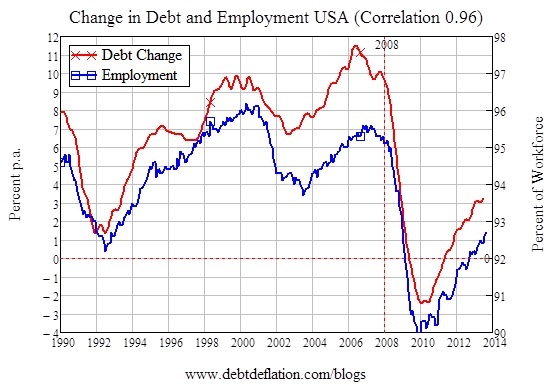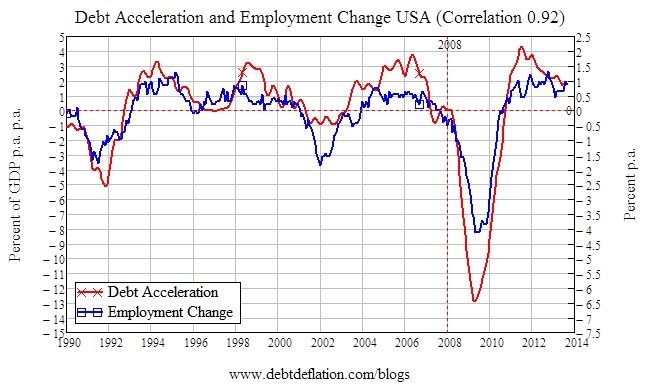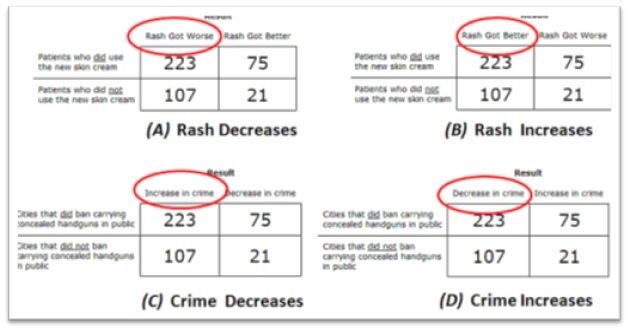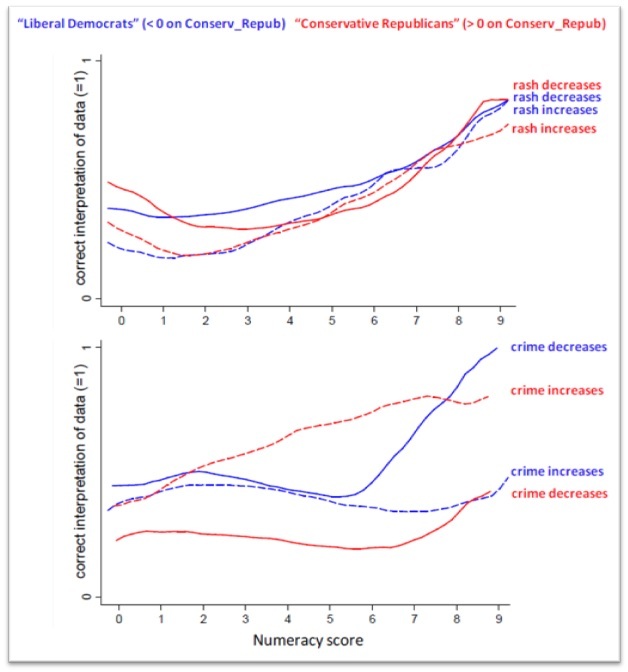When economic theory fails the maths exam
Eight years ago, in December 2005, I began warning of an impending economic crisis that would commence when the rate of growth of private debt started to fall. My warnings hit a popular chord: journalists throughout the world picked it up and publicised my views – as well as similar arguments from Nouriel Roubini, Dean Baker, Ann Pettifor, Michael Hudson, Wynne Godley, and a few others.
But our arguments were ignored by the economics profession because, according to mainstream economic theory, private debt should have no impact on aggregate demand. As Bernanke put it, lending simply transfers spending power from lender to borrower, and “pure redistributions should have no significant macro-economic effects” (Bernanke, Essays on the Great Depression, p. 24).
Yet the empirical evidence that change in debt does have “significant macro-economic effects” is compelling: the correlations of change in debt to the level of employment (Figure 1), and of acceleration in debt to changes in employment (Figure 2), are overwhelming.
Figure 1: Compelling visual evidence? Not to a mainstream economis
Figure 2:Something else to ignore because it doesn't pass the a priori test

This visually compelling numerical evidence of what caused the crisis was and still is ignored by mainstream economists, while less numerate journalists latched onto it. Why? You would expect that the more numerate a person is, the more he would take evidence like this seriously.
But that isn’t the case it seems – and a fascinating new study of numeracy and reasoning has indicated why this might be so. It seems that when an issue is politically neutral, a higher level of numeracy does correlate with a higher capacity to interpret numerical data correctly. But when an issue is politically charged – or the numerical data challenges a numerate person’s sense of self – numeracy actually works against understanding the issue. The reason appears to be that numerate people employed their numeracy skills to evade the evidence, rather than to consider it.
The research paper, Motivated Numeracy and Enlightened Self-Government, tested people’s ability to interpret numerically challenging data against their ratings on a numeracy test, and their political allegiances. Precisely the same data was presented as the results of two quite different studies: whether a new skin care product did or did not reduce skin rashes, and whether gun control laws did or did not reduce crime. The hypothetical data was set up so that half of the survey group saw objectively positive results – the skin care product worked, or gun control reduced homicide rates – and the other saw objectively negative results in each case (see Figure 3).
Figure 3: The hypothetical data presented as real data to different segments of the survey group

The “data” was designed to be confusing to those with low numeracy skills: a simple comparison of numbers in the first column would lead to reaching the wrong conclusion – that the skin cream increased rashes when it reduced them, or that gun control laws decreased crime when it increased it. Getting the correct answer involved a comparison of the ratios of the two columns.
The experimenters expected that more numerate people would trump less numerate people in both instances – so that effectively, a higher level of numeracy would lead to a lower level of ideological bias, whether the issue was politically charged or not, and whether the subject was conservative (Republican) or progressive (Democrat). The argument, effectively, was that a higher level of intellectual skill would mean higher cognition in general and a lower level of political bias. As a psychological hypothesis, they termed this the “Science Comprehension Thesis” (SCT).
Mentally, the reason for the expected bias of the less numerate people was that they would use what Kahneman called System 1 or “fast” thinking, which is more instinctive and emotional – the sort of reasoning that stops you becoming a meal for a lion on the Serengeti. More numerate people were expected to also employ System 2 or “slow”, logical reasoning – the sort that enables you to turn the lions into prey rather than predators.
But there was an alternative hypothesis as well, which proposed that more numerate people would use their greater numerical skills to hang on to pre-existing beliefs, in order to preserve their membership of a group that was socially important to them. The researchers termed this hypothesis the “Identity-protective Cognition Thesis” (ICT):
Individuals, on this account, have a large stake – psychically as well as materially – in maintaining the status of, and their personal standing in, affinity groups whose members are bound by their commitment to shared moral understandings. If opposing positions on a policy-relevant fact – e.g., whether human activity is generating dangerous global warming – came to be seen as symbols of membership in and loyalty to competing groups of this kind, individuals can be expected to display a strong tendency to conform their understanding of whatever evidence they encounter to the position that prevails in theirs.
The results are summarised in Figure 4 – and interpreting it might itself be challenging if you’re not American, because red signifies conservative while blue signifies progressive!
The simplest observation is that higher numeracy led to a higher ability to interpret the data in the politically-neutral skin rash data, and that there was no significant difference in ability due to political allegiance.
Figure 4: Correct results by topic versus numeracy level and political allegiance

The more complex result is that higher levels of numeracy led to higher, rather than lower, polarisation on the politically charged issue of gun control. There was no gap between Republicans and Democrats of low numerical skill when interpreting data that found that gun control increased crime: both groups were equally bad at getting the right answer. But there was a very big gap for numerate Republicans and Democrats when the “results” contradicted their pre-existing beliefs. Highly numerate Democrats were little better than innumerate Democrats in correctly interpreting data that showed that gun control increased crime; and equally, highly numerate Republicans were little better than innumerate ones in interpreting data that showed that gun control reduced crime.
The polarisation between Republicans and Democrats also increased as numeracy rose – the opposite of what you would expect if you thought political differences over objective data arose from an inability to interpret that data. There was no difference between innumerate Republicans and Democrats when presented with data that implied that gun control failed, but a very large gap between their numerate brethren. The substantial gap between innumerate Republicans and Democrats when presented with data that implied that gun control worked (we’re talking America, after all) became a chasm between the numerates.
The authors found the implications of their study for democracy rather depressing, since it implies that both evidence and intelligence make precious little difference to how people will vote on contentious issues – which are after all the only ones we do vote on. The need to preserve a sense of identity matters more than the evidence – and this can’t be treated as “irrational” behavior either, because it’s quite rational to want to retain membership of a group that is immediately important to you.
Numeracy can make you blind. Who’d a thought?
Someone who did belatedly reach the same conclusion was one of history’s great numerates, Max Planck – the father of quantum mechanics. He found it near impossible to convince his fellow physicists to accept his new – and empirically far more accurate – characterisation of the nature of energy, and he ultimately concluded that:
A new scientific truth does not triumph by convincing its opponents and making them see the light, but rather because its opponents eventually die, and a new generation grows up that is familiar with it. (Max Planck).
Planck’s pessimism might well turn out to be optimism when compared to how economics “evolves”. As John Quiggin put it in his book Zombie Economics (which hands down has the best cover of an economics book that I’ve ever seen), ideas that manifestly conflict with empirical data continue to exist long after reality killed them. The data on private debt and employment should long ago have killed the “Loanable Funds” model of lending that led Bernanke and his tribe to ignore private debt before the crisis hit, but I expect they’ll hang on to their pet theory and find a way to make it appear compatible with the data instead—and Larry Summers may well have given them the means to remain part of The Great Undead with his “secular stagnation” hypothesis.
Kahan and colleagues’ research also has implications for people in the global warming debate – and many other areas of social conflict over empirical issues. Each side tends to deride the other as lacking the ability to interpret the data – thus thinking they are more numerate than their opponents. Those who believe that global warming is happening (guilty as charged Your Honour) tend to think that their opponents are scientifically dumber than they are, and simply can’t process the overwhelming numerical evidence in favour of the hypothesis; those who reject global warming believe their opponents are politically motivated dumbos who are deliberately hoodwinking themselves.
But this research implies that leading lights on both sides of the argument could be just as numerate as each other, and numerical evidence alone will never cause one side to concede defeat. Only reality itself will ultimately end that debate.
Steve Keen is Associate Professor of Economics & Finance at the University of Western Sydney and author of Debunking Economics and the blog Debtwatch.













